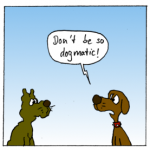“Because I’ve got to have faith
…faith
…faith”
So sang George Michael almost a generation ago. It would appear that a number of IP stakeholders are thumping to this very beat, casting their lot with dogmatic IP assertions, and refusing to consider any fact based empiricism.
Sad really! I’ve been harping on the need to move away from “faith based” to “fact based” IP for as long as I can remember. But, in this rhetorical IP war, where blindfolds have been drawn up with dogmatic ardour, repetition is perhaps the name of the game…
And in that vein, let me bring you an excellent data driven counter to the self serving campaign unleashed by some to paint Indian IP in a bad light. We’ve countered this insidious campaign several times in the past, and readers may see our writings here, here and here.
IPA Report on US IP Assertions
This time around, this extremely persuasive counter is by the IPA, an organisation that has had major impact on the Indian IP policy debates and headed by that indefatigable one man army that goes by the name of Dilip Shah. So what does the IPA report state? I extract some key portions below:
“A section of the U.S. pharmaceutical industry represented mainly by Mr Ajay Banga (USIBC) and Mr John Castellani (PhRMA) may express concern about India’s regime, in particular about protection and enforcement of patents in the field of pharmaceuticals. However, these concerns are misplaced on two counts:
Firstly, they are using the US regime as benchmark to evaluate India’s IP regime. But India has never agreed to conform to the US standards. India has accepted international standards as embodied in the TRIPS Agreement. The US is a signatory to the TRIPs Agreement. India is fully compliant with it. Hence, these concerns are misplaced.
Secondly, a cursory glance at patents granted in various fields (Annexure-A) including pharmaceuticals, from 1 January 2005 to 10 October 2014 show that 82% of patents granted are to foreign companies. Thus, it would be incorrect to say that India does not recognize patents or it discriminates against foreign companies.
It may be noted that several US corporations (Boeing, Pepsico, Abbot, Gilead & Others) academics (from Columbia, Oklahoma & Others) and civil society organizations (KEI, MSF, UACT and Others) have expressly supported India’s IP regime.”
Patent Invalidations: US vs India
But the best part of the report are these numbers on patent invalidation, drawn from a United States Patents Invalidity Study conducted in 2012:
“Between 2007 and 2011, 283 cases were identified in US Federal District Courts where patent validity was determined. Of these, only in 39 cases was the patent held valid and enforceable. In 253 cases, therefore, the patent was held to be invalid.
As against this, the Intellectual Property Appellate Board (IPAB) and the High Courts in India have revoked only 29 patents (10 of Indian Companies and 19 of Foreign Companies) during the 10-year period.”
In other words, US district courts have effectively invalidated almost 90% of all patents that have been challenged! That is one hell of a number! And yet the US government and some of the industrial masters that it serves make a huge song and dance when so much as one patent is invalided in India! Unfortunately, our mainstream press also contributes a bit to this negative perception as they gleefully recount the patent liquidations, while keeping mum about the patent wins.
Anyway hope this “fact” based IP approach will persuade those reposing blind faith in the insidious IP reports and rankings (unleashed by some in big pharma and their crony governments and think tanks) to reassess their position on Indian IP.
Of course Indian IP is still complex and confusing and as I noted in an editorial some time ago: “Everything you say about Indian IP can be equally true and equally false”. But that really is the fun of Indian IP…served up with its fair share of spice, inconsistency and uncertainty! And may perhaps account for why even in an international platform such as IPWatch, the most widely read stories are Indian IP stories. And on that note, let me wish all our readers a wonderful republic day, where we pledge our alliance to the pursuit of truth and not dogma.
ps: Given that I’ve harped endlessly on the pursuit of truth and data, here is one data point that the IPA got wrong in their report. In their Annexure B, they list out the eBay vs Merck Exchange case as one involving a patent invalidation. This case relates to standards for grant of patent injunctions (where public interest was emphasised as a distinct factor to be considered by the US Supreme Court) and did not entail a patent invalidation.


sir, the case of ebay vs merc xchange highlighted that the merc was denied the injunction based upon the cocnlusion that although it had the patent over the auction process adopted by ebay, but since it did not put it to commercial use, hence would not have suffered an irreparable loss, if the injunction be so denied.
however how is the auction process of ebay related to public purpose is still not clear